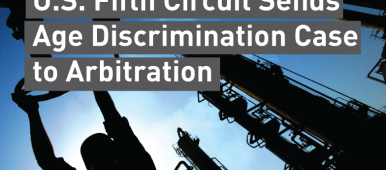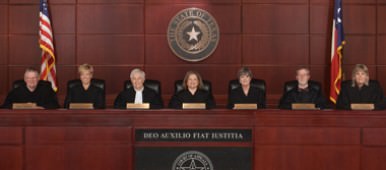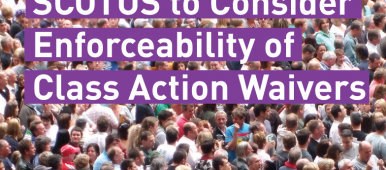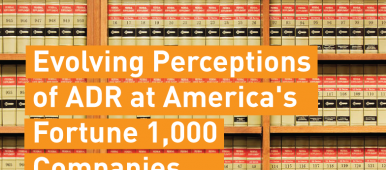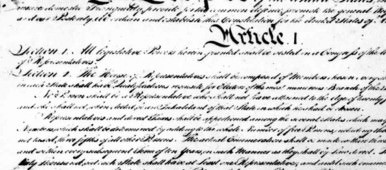
- Mediation
- Arbitration
- Court Neutrals
- Online Dispute Resolution
- Technology
- Court Decisions
- More
- Legislation
- Healthcare
- Guest Posts
- John DeGroote
- John C. Fleming
- Rick Freeman
- Professor Peter Friedman
- Honorable W. Royal Furgeson, Jr.
- James M. Gaitis
- Laura A. Kaster
- Professor John Lande
- Philip J. Loree, Jr.
- Michael McIlwrath
- F. Peter Phillips
- Professor Alan Scott Rau
- Professor Thomas J. Stipanowich
- Professor S.I. Strong
- Richard Webb
- Glen M. Wilkerson
- International arbitration
- Regulation
- Sports and Entertainment
- We’re Back!!!!Well, it’s been a while since we published and that is about to change. Since I spent much of last year becoming
 JAMS Welcomes Karl Bayer to its Panel of NeutralsJAMS, the world’s largest private alternative dispute resolution (ADR) provider, is pleased to announce that Karl Bayer
JAMS Welcomes Karl Bayer to its Panel of NeutralsJAMS, the world’s largest private alternative dispute resolution (ADR) provider, is pleased to announce that Karl Bayer Class Action Waivers in Arbitration Agreements: The Twenty-First Century Arbitration Battleground and Implications for the EU CountriesLinda S. Mullenix, Morris & Rita Atlas Chair in Advocacy at the University of Texas School of Law, has written “Class Ac
Class Action Waivers in Arbitration Agreements: The Twenty-First Century Arbitration Battleground and Implications for the EU CountriesLinda S. Mullenix, Morris & Rita Atlas Chair in Advocacy at the University of Texas School of Law, has written “Class Ac Picking the Proper Technological Tool for Problem-Solving in ArbitrationProfessor Amy J. Schmitz, John Deaver Drinko-Baker & Hostetler Chair in Law and Co-Director of the Translational Data An
Picking the Proper Technological Tool for Problem-Solving in ArbitrationProfessor Amy J. Schmitz, John Deaver Drinko-Baker & Hostetler Chair in Law and Co-Director of the Translational Data An
Recent Posts
U.S. Fifth Circuit Sends Age Discrimination Case to Arbitration
The United States Fifth Circuit Court of Appeals has held that an age discrimination claim must be arbitrated. In Klein v. Nabors, No. 11-30824 (5th Cir. 2013), an oil rig worker, Gary Klein, sued his former employer, Nabors Drilling USA, for age discrimination in the Western District of Louisiana after he was terminated from the company. Prior to his employment, Klein reportedly signed a company form that acknowledged all employment disputes would be subject to arbitration using the corporation’s dispute resolution program. In response to the lawsuit, Nabors filed a motion to compel arbitration and a motion to stay the court proceedings. The Western District of Louisiana denied Nabors’ motion and held that the arbitration requirements included in the acknowledgement form were ambiguous. Nabors then appealed the matter to the Fifth Circuit. First, the three-judge panel dismissed Klein’s argument that the acknowledgement form was ambiguous and he did not agree to exclusively arbitrate all employment law claims against Nabors. The court said, Here, the agreement includes both the Acknowledgment and the Program. The Acknowledgment provides that Klein received a copy of the Program and understood that it was not a contract of employment. The Acknowledgment also explains that nothing in the Program is intended to violate or restrict any rights guaranteed to Klein by state or federal law. By signing the Acknowledgment, Klein agreed to adhere to the Program “and its requirement for submission of disputes to a process that may include mediation and/or arbitration.” Next, the court analyzed the provisions of the dispute resolution program and stated Klein’s age discrimination claim was subject to arbitration despite that the program does not preclude the use of nonbinding dispute resolution methods as a way to avoid arbitration. According to the Fifth Circuit panel, Interpreting the Acknowledgment and the Program as a whole, we find an unambiguous common intent that arbitration is to be the final, binding method of resolution under the Program. The allowance of nonbinding methods does not change the analysis. Parties are always free to attempt to work together and reach a mutually beneficial result before absorbing the not insignificant costs associated with arbitration. Their decision to do so does not strip an arbitration agreement of its effect. The court continued by stating that the permissive language included in the acknowledgement form explicitly states any employment disputes will be subject to binding arbitration and fails to offer the option for judicial resolution. Finally, the Appeals Court said Klein’s reliance on a provision in the acknowledgement form which states the company’s dispute resolution program was not intended “to violate or restrict any rights of employees guaranteed by state or federal law” meant a judicial remedy was also available was misplaced. The court stated, Our task is to interpret each provision in a manner consistent with the contract as a whole—not to tailor our interpretation of the entire contract to fit one provision. When interpreting the provisions together, it becomes clear that the Acknowledgment disclaims a restriction only on substantive rights that would have been available to Klein in a judicial forum. This interpretation is consistent with both the Program’s language and the law governing arbitration agreements. Because the Fifth Circuit panel found the parties had an unambiguous agreement to arbitrate, the appellate court reversed the lower court’s ruling and remanded the case with instructions to submit the dispute to arbitration.
Continue reading...Fort Worth Appeals Court Holds Ruling on Motion to Compel Arbitration is a Ministerial Duty
The 2nd District Appeals Court in Fort Worth has held that a trial court has a ministerial duty to rule on a party’s motion to compel arbitration. In Kelly v. Hinson, No. 02–12–00058–CV, (Tex.App.–Fort Worth, 2012), two investors, Phillip Hinson and Don Siratt, filed a lawsuit against Technotree International, LLC and two of the company’s officers, William J. Kelly and Ariel I. Quiros, (“LLC”) to recover a refund of certain investments made in the corporation in 1999. According to the investors, William J. Kelly personally agreed to fully refund Hinson and Siratt’s investment of $130,000 after ten years if total dividends and distributions paid to them did not equal that amount. As part of their investment, both Hinson and Siratt received a copy of the LLC’s regulations and operating agreement which contained an arbitration provision. After the investors filed their lawsuit, the pro se LLC repeatedly asked the court to compel the dispute to arbitration through a number of letters and telephone calls. A Tarrant County District Court judge did not rule on the parties’ motion to compel arbitration and instead granted a motion for summary judgment that was later filed by the investors. The LLC then appealed the case to Texas’ 2nd District Court of Appeals. The investors argued that the trial court properly failed to rule on the LLC’s request for arbitration because the pro se LLC did not specifically request a hearing on the matter. In response, the Fort Worth court stated, “[b]oth Texas and federal law strongly favor arbitration.” In addition, The Agreement and the arbitration clause at issue were specifically identified in the motion, and a copy of the Agreement containing the arbitration clause was attached to the motion. During the next eleven months, Appellants repeatedly requested a hearing and a ruling on the arbitration motion; Appellants mailed three letters to the trial court requesting a ruling or a hearing on their motion to compel arbitration, served opposing counsel with copies of the letters, sent in a certificate of conference indicating that Appellees did not agree with the motion to compel arbitration, and filed a motion for a telephonic hearing on their motion to compel arbitration. Appellants communicated via telephone with the court coordinator in an effort to set a hearing on their motion. We hold that the trial court had a ministerial duty to set Appellants’ motion for arbitration for a hearing and to rule on it. The appeals court continued, Appellees’ contention that Appellants “did not request a hearing, or object to any perceived refusal by the trial court to rule” is not supported by the record before us. As set forth above, Appellants’ letters requested a ruling and a hearing, and ultimately Appellants filed a motion explicitly requesting a fifteen-minute telephonic hearing on their motion to compel arbitration. Next, the 2nd District dismissed the investors’ argument that the LLC waived its right to a trial court ruling on the motion to compel arbitration because the LLC failed to file a response to the investors’ motion for summary judgment. According to the Fort Worth court, the investors’ position was simply not supported by case law. Finally, the appeals court disagreed with the investors’ argument that the LLC’s motion to compel arbitration was void because it was not signed by an attorney. The court stated, Appellees neither objected in the trial court to the pro se status of the motion to compel arbitration nor filed a motion requesting that Quiros show authority to proceed on behalf of TTI. See Tex. R. Civ. P. 12. A document filed in court by a nonlawyer purportedly on behalf of a corporation is defective but not void and may be effective for certain purposes. The court went on to state, Thus, Appellants’ motion to compel arbitration—signed by a nonlawyer, managing member of TTI—was not void ab initio, and its unobjected-to, pro se status did not excuse the trial court from performing the ministerial duties of setting the motion for a hearing and ruling on it. Because the trial court had no discretion to refuse to rule on the LLC’s motion to compel arbitration, the 2nd District Appeals Court reversed and remanded the case without reaching the merits.
Continue reading...SCOTUS to Consider Enforceability of Class Action Waivers in Arbitration Agreements
Tomorrow, the United States Supreme Court will hear oral arguments in American Express Corp. v. Italian Colors Restaurant, et al. (No. 12-133). The appeal from the United States Court of Appeals for the Second Circuit addresses whether the Federal Arbitration Act allows a court to invalidate an arbitration agreement that does not permit class arbitration of a federal law claim. In the case, a number of small businesses, including Italian Colors Restaurant, accuse American Express of violating federal anti-trust law because the company allegedly forced them to accept credit cards with high transaction and other fees in order to accept American Express as a customer payment option. Although each of the merchants reportedly agreed to arbitrate any dispute with the company and the parties’ arbitration agreement does not permit class arbitration, several class action lawsuits were eventually filed. In the class action lawsuits, the merchants argued that obtaining individual arbitral awards would be cost prohibitive and would effectively deny each company’s rights when compared with the potential for recovery. In 2003, the class action cases were consolidated in the Southern District of New York. The district court reportedly ordered the disputes to bilateral arbitration. The merchants appealed the case to the Second Circuit. The Appeals Court overturned the lower court’s order by stating the class action waiver was unenforceable. In addition, the Second Circuit reconsidered and reaffirmed its own holding after the Supreme Court’s decision in both Stolt-Nielsen S.A. v. AnimalFeeds Int’l Corp. and AT&T Mobility LLC v. Concepcion. Last May, the Second Circuit also denied a request for rehearing of the case en banc. In the company’s appeal to the Supreme Court, American Express argues that the appellate court’s decision directly conflicts with the high court’s holding in Concepcion. In that case, the Supreme Court held a California law stating a class action waiver in an arbitration provision was unenforceable directly conflicted with the Federal Arbitration Act. In addition, American Express argues the Supreme Court previously considered and dismissed the merchants’ argument that a class arbitration waiver would make it impossible for them to vindicate their rights. This case will be the third time in three years the high court has considered the scope of a class action waiver in an agreement to arbitrate. Stay tuned to Disputing for more about this fascinating case!
Continue reading...Evolving Perceptions of ADR at America’s Fortune 1,000 Companies
Professors Thomas Stipanowich (Pepperdine University School of Law) and J. Ryan Lamare (Pennsylvania State University) have posted a paper entitled “Living with ‘ADR’: Evolving Perceptions and Use of Mediation, Arbitration and Conflict Management in Fortune 1,000 Corporations” on the Social Science Research Network. Here is the abstract: As attorneys for the world’s most visible clients, corporate counsel played a key role in the transformation of American conflict resolution in the late Twentieth Century. In 1997 a survey of Fortune 1,000 corporate counsel provided the first broad-based picture of conflict resolution processes within large companies. In 2011, a second landmark survey of corporate counsel in Fortune 1,000 companies captured a variety of critical changes in the ways large companies handle conflict. Comparing their responses to those of the mid-1990s, clear and significant evolutionary trends are observable, including a further shift in corporate orientation away from litigation and toward “alternative dispute resolution (ADR),” moderated expectations of ADR; increasing use of mediation, contrasted with a dramatic fall-off in arbitration (except, importantly, consumer and products liability cases); greater control over the selection of third-party neutrals; growing emphasis on proactive approaches such as early neutral evaluation, early case assessment, and integrated systems for managing employment disputes. This article summarizes and analyzes the results of the 2011 Fortune 1,000 survey, compares current data to the 1997 results, and sets both studies against the background of a half-century of evolution. The article concludes with reflections on the future of corporate dispute resolution and conflict management and related research questions. The full paper is available to download (free of charge), along with other scholarly papers written by Professor Stipanowich.
Continue reading...Arbitration
S.I. Strong, Associate Professor of Law and Senior Fellow at the University of Missouri School of Law‘s Center for the Study of Dispute Resolution, recently published a thoughtful book review entitled Constitutional Conundrums in Arbitration, 15 Cardozo Journal of Conflict Resolution __ (forthcoming 2013). Here is the abstract: Professor Peter Rutledge’s new book, Arbitration and the Constitution (Cambridge University Press, 2013), offers the first comprehensive study of the constitutionality of arbitration. The discussion draws together arguments and evidence from a diverse range of constitutional and arbitral authorities and introduces examples and issues from many different sub-disciplines within the world of arbitration. This review essay considers whether Rutledge succeeds in his bold experiment of blending together two such seemingly diverse areas of law by taking a critical look at the strengths and weaknesses of Rutledge’s analysis while simultaneously setting the book within the context of existing and future forms of constitutional and arbitral scholarship. This and other scholarly papers authored by Professor Strong are available for download (without charge) from the Social Sciences Research Network.
Continue reading...Mediation
Healthcare Disputes
Legal Research
About Disputing
Disputing is published by Karl Bayer, a dispute resolution expert based in Austin, Texas. Articles published on Disputing aim to provide original insight and commentary around issues related to arbitration, mediation and the alternative dispute resolution industry.
To learn more about Karl and his team, or to schedule a mediation or arbitration with Karl’s live scheduling calendar, visit www.karlbayer.com.



